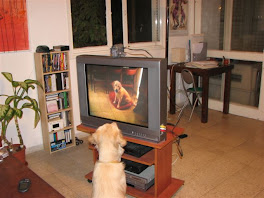I often put links to NYTimes articles, and then they expire and you have to pay to read them. I think the paper has changed its policy, but just in case I'm going to paste in a pretty incredible Editorial. Definitely stuff I struggle with as an over-apologetic person who feels funny and sometimes wrong for keeping a blog.
Politeness and Authority at a Hilltop College in Minnesota
By VERLYN KLINKENBORG
Published: October 15, 2007
Last week I spent a couple of days in western Minnesota, giving a talk and visiting some classes at Gustavus Adolphus College. ...
I sat in on four classes, which were marred only by politeness — the deep-keeled Minnesotan politeness that states, as a life proposition, that you should not put yourself forward, not even to the raising of a hand in class.
Things always warmed up, but those first lingering notes of hesitation were something to behold. I tried to think of it as modesty, consideration for others and reluctance in the presence of a guest — from New York nonetheless. And yet I kept wondering just how such bright, personable students had become acculturated to their own silence. I had grown up in a similar place and knew a little how they felt, but that was a long time ago.
Midway through lunch one day a young woman asked me if I noticed a difference between the writing of men and the writing of women. The answer is no, but it’s a good question. A writer’s fundamental problem, once her prose is under control, is shaping and understanding her own authority. I’ve often noticed a habit of polite self-negation among my female students, a self-deprecatory way of talking that is meant, I suppose, to help create a sense of shared space, a shared social connection. It sounds like the language of constant apology, and the form I often hear is the sentence that begins, “My problem is ...”
Even though this way of talking is conventional, and perhaps socially placating, it has a way of defining a young writer — a young woman — in negative terms, as if she were basically incapable and always giving offense. You simply cannot pretend that the words you use about yourself have no meaning. Why not, I asked, be as smart and perceptive as you really are? Why not accept what you’re capable of? Why not believe that what you notice matters?
Another young woman at the table asked — this is a bald translation — won’t that make us seem too tough, too masculine? I could see the subtext in her face: who will love us if we’re like that? I’ve heard other young women, with more experience, ask this question in a way that means, Won’t the world punish us for being too sure of ourselves? This is the kind of thing that happens when you talk about writing. You always end up talking about life.
These are poignant questions, and they always give me pause, because they allow me to see, as nothing else does, the cultural frame these young women have grown up in. I can hear them questioning the very nature of their perceptions, doubting the evidence of their senses, distrusting the clarity of their thoughts.
And yet that is the writer’s work — to notice and question the act of noticing, to clarify again and again, to sift one’s perceptions. I’m always struck by how well fitted these young women are to be writers, if only there weren’t also something within them saying, Who cares what you notice? Who authorized you? Don’t you owe someone an apology?
Every young writer, male or female, Minnesotan or otherwise, faces questions like these at first. It’s a delicate thing, coming to the moment when you realize that your perceptions do count and that your writing can encompass them. You begin to understand how quiet, how subtle the writer’s authority really is, how little it has to do with “authority” as we usually use the word.
Young men have a way of coasting right past that point of realization without even noticing it, which is one of the reasons the world is full of male writers. But for young women, it often means a real transposition of self, a new knowledge of who they are and, in some cases, a forbidding understanding of whom they’ve been taught to be.
Perhaps the world will punish them for this confidence. Perhaps their self-possession will chase away everyone who can’t accept it for what it is, which may not be a terrible thing. But whenever I see this transformation — a young woman suddenly understanding the power of her perceptions, ready to look at the world unapologetically — I realize how much has been lost because of the culture of polite, self-negating silence in which they were raised.
Subscribe to:
Post Comments (Atom)



No comments:
Post a Comment